Cold air may help lose weight: study
Updated: 2014-01-23 15:12
(Xinhua)
|
||||||||
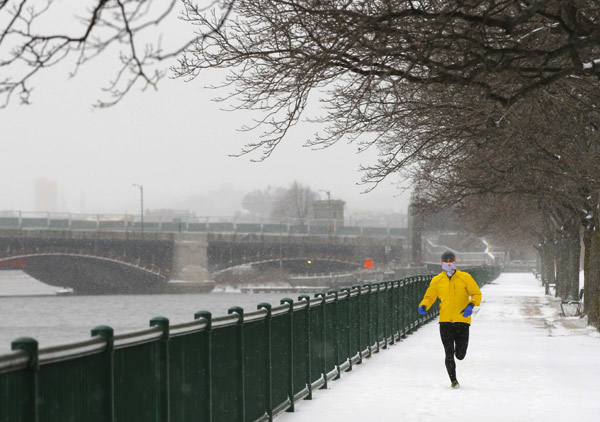 |
|
A jogger runs along the Charles River in Cambridge, Massachusetts January 22, 2014. [Photo/Agencies] |
WASHINGTON - Turning down temperatures at home and office may help you fight obesity, according to a new study published Wednesday in the US journal Trends in Endocrinology & Metabolism.
New evidence suggests that regular exposure to mild cold may be a healthy and sustainable way to help people lose weight, researchers from Maastricht University Medical Center in The Netherlands said.
In other words, our warm and cozy homes and offices might be partly responsible for our expanding waistlines, they added.
"Since most of us are exposed to indoor conditions 90 percent of the time, it is worth exploring health aspects of ambient temperatures," first author Wouter van Marken Lichtenbelt of Maastricht University Medical Center said in a statement.
"What would it mean if we let our bodies work again to control body temperature? We hypothesize that the thermal environment affects human health and more specifically that frequent mild cold exposure can significantly affect our energy expenditure over sustained time periods."
Marken Lichtenbelt said they started studying the effects of mild cold about 10 years ago, mostly because it had received so little attention.
They found that a more variable indoor temperature, one that is allowed to drift along with temperatures outside, might be beneficial, although long-term effects still await further investigation.
A previous study from researchers in Japan revealed a decrease in body fat after people spent 2 hours per day at 17 degrees Celsius for six weeks.
The new study also found that people get used to the cold over time. After six hours a day in the cold for a period of 10 days, people in the study increased heat-generating, calorie-burning brown fat, felt more comfortable and shivered less at 15 degree Celsius.
At least in young and middle-aged people, non-shivering heat production can account for a few percent up to 30 percent of the body's energy budget, they said. That means lower temperatures can significantly affect the amount of energy a person expends overall.
So perhaps, in addition to our exercise training, people need to train ourselves to spend more time in the cold, the researchers said.
Managing that in practice, however, might take some convincing. "Indoor temperature in most buildings is regulated to minimize the percentage of people dissatisfied," the researchers wrote.
"This results in relatively high indoor temperatures in wintertime. This is evident in offices, in dwellings and is most pronounced in care centers and hospitals. By lack of exposure to a varied ambient temperature, whole populations may be prone to develop diseases like obesity. In addition, people become vulnerable to sudden changes in ambient temperature."
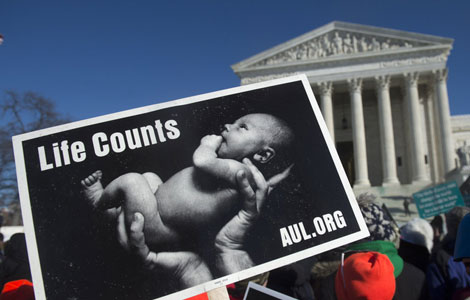
 US anti-abortion rallies march for life
US anti-abortion rallies march for life
 PLA navy drills in South China Sea
PLA navy drills in South China Sea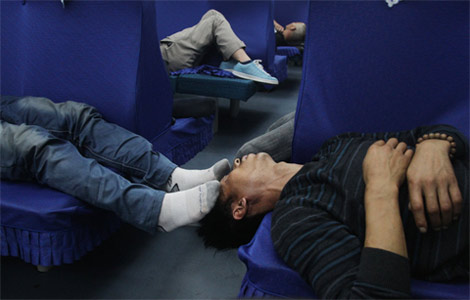
 Catnaps help travelers keep going
Catnaps help travelers keep going
 Japan seeks US understanding about dolphin hunt
Japan seeks US understanding about dolphin hunt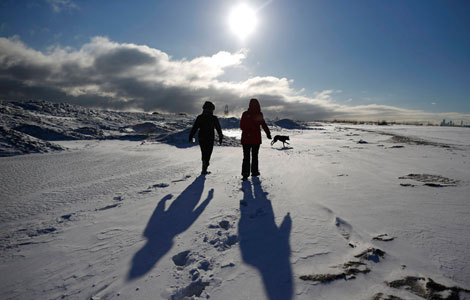
 Snow storm hits US East Coast
Snow storm hits US East Coast
 China begins receiving oil from Russia
China begins receiving oil from Russia
 Underwater photos exhibited in Beijing
Underwater photos exhibited in Beijing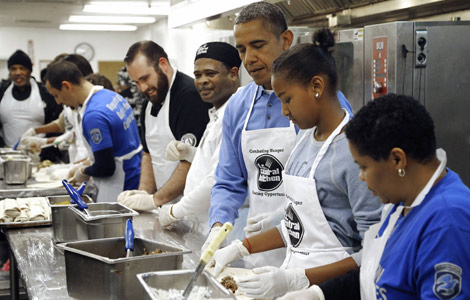
 Obama honors Dr King with volunteer work
Obama honors Dr King with volunteer work
Most Viewed
Editor's Picks

|

|

|

|

|

|
Today's Top News
Lawsuit blames plane’s warning systems for crash
Argentine president ends long public silence
Report shows big rise in Chinese overseas
Export adds to air blight
China approves 12 more free trade zones
Li calls for cooperative global economic system
Boeing sales soar to new heights
China to keep up with transgenics
US Weekly

|

|







